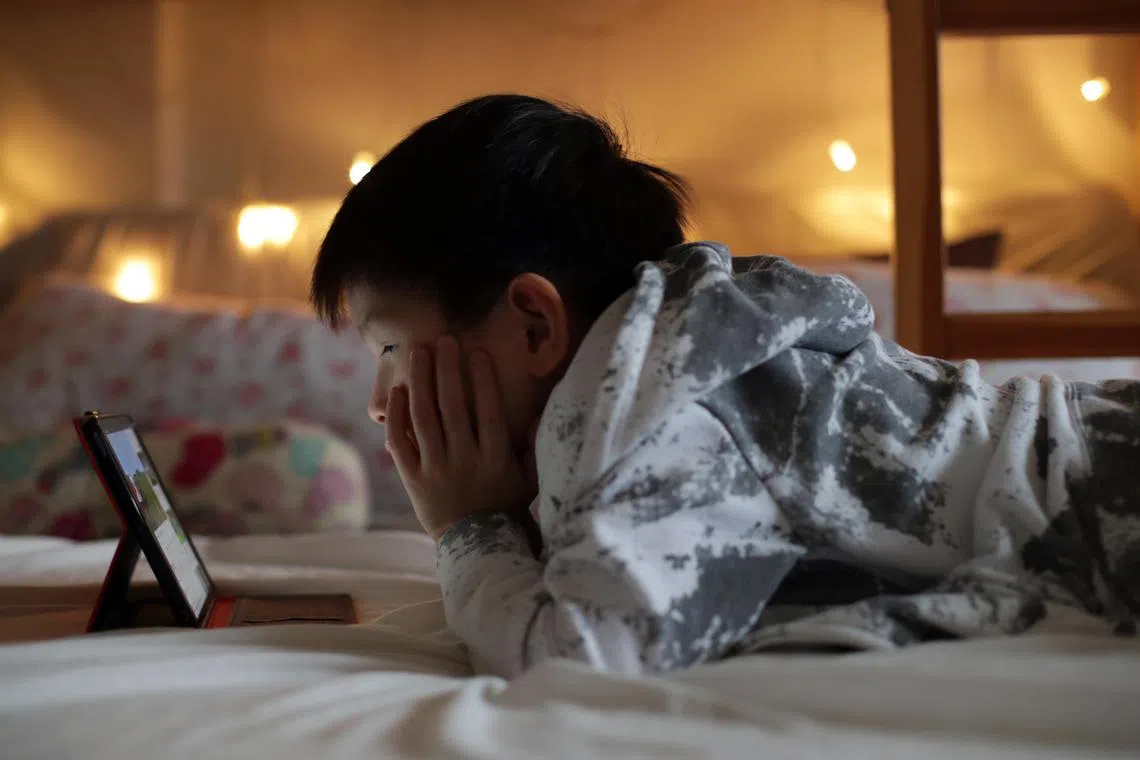Screen time eating into physical playtime for pre-schoolers: Study
Sign up now: Get ST's newsletters delivered to your inbox

More than half of the parents surveyed said that they consider screen time to be a part of their children’s playtime.
PHOTO: ST FILE
SINGAPORE – The use of devices is eating into playtime for young children, despite most parents believing that non-screen play is important for them, a recent study has shown.
The study conducted by non-profit organisation Suncare SG found that although nine in 10 parents feel non-screen play is important, they still allow their pre-school children to play on devices for one to two hours a day at weekends.
More than half of the parents surveyed said they consider screen time to be a part of their children’s playtime.
And close to 20 per cent of parents indicated that their child spends less than one hour outdoors per day at weekends.
The study, conducted from June to July, included more than 1,000 parents who have children between the ages of three and six. Suncare SG focuses on supporting the well-being of children and youth, and the aim of its study was to identify the pain points parents have in connection with parenting and play.
Associate Professor Sirene Lim, vice-dean of the S R Nathan School of Human Development at the Singapore University of Social Sciences, said medical practitioners and the World Health Organisation recommend that children aged three to six have at least 180 minutes of physical activity throughout the day.
Parents completed an online survey with questions about whether they believe play is important, and what their own childhood play experiences were like.
They were also asked about their attitudes to using screen time as a play activity, how much outdoor playtime their children had during weekends, and how much money they spent on playtime activities.
The study found that parents who spent more time playing as children are more likely to have children who play more, whether indoors or outdoors.
Ms Ciara Yeo, head of special projects at Suncare SG, said this suggests that parents’ past play experiences influence their attitudes and behaviours towards their children’s playtime, and could shape how much their children play.
Play for fun or to learn?
Prof Lim, who supported the Suncare SG team in designing the study’s questionnaire, said that according to classic theories of child development, play is important for learning, and for healthy social and emotional development.
She said some studies outside of Asia have found that differences in parenting practices are linked to beliefs about play.
“Those who think that play is just for entertainment are less likely to play with their children, while parents who believe that play is necessary in supporting their child’s overall development are more likely to be their child’s play partner, engaging in more creative and imaginative activities with their child,” said Prof Lim.
In the study, among the parents who indicated that playtime was “very important”, 45 per cent said playing together with their child helps strengthen their parent-child relationship, while about 30 per cent felt that play can help prepare their child for school or academic learning.
She said similar studies in China show that parents there believe in “eduplay” – structured forms of playing for learning or academic purposes.
Chinese parents are less inclined to provide children with less structured free play.
“These two groups who consider play as serving different purposes are reflective of Singapore’s evolving culture as it is at a confluence of ‘Eastern’ and ‘Western’ thinking about how we should raise children,” said Prof Lim.
Popular playtime activities, as indicated by parents, were physical games such as playing with balls, arts and crafts activities like drawing and painting, and tabletop games like board games and puzzles.
The study also found that most parents spend less than $100 a month on their child’s playtime activities.
Ms Yeo said indoor activities at indoor playgrounds and sports facilities were the most expensive activities mentioned by parents, with the costs including entrance fees, equipment and subscriptions for these facilities.
Prof Lim said that although the results are encouraging in showing that most parents see the benefit of play for children, more can be done to give children opportunities for physical playtime.
“The data also indicates that some parents may require some support or ideas to be able to offer their children playtime that is not screen-dependent and more physically active, inexpensive, creative and fun,” she said.
Mr Eddy Goh, 42, makes it a point to take his 26-month-old son for play activities for two to three hours at weekends. These include swimming sessions, and trips to the playground and indoor play areas.
“It’s a way for me to expend his energy, develop his psychomotor skills and get him to interact with other kids as well,” said Mr Goh, who works in sales.
While he feels that young children should not be exposed to mobile devices, he said that it is very hard to avoid screen time.
“I think it cannot be helped nowadays. They see cousins or their friends using it (a mobile device), then they also want it.”
Mr Goh feels there are also benefits to letting his son watch television or other programmes on mobile devices.
“Most of these programmes are quite educational, so he learns from them.”



